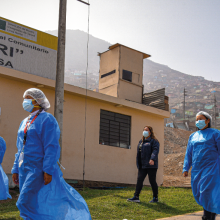The Partners In Health (SES) policy for protection and response in cases of sexual exploitation, abuse, harassment and sexual harassment (PEASH) is a key commitment to take care of all people involved in its programs, units and projects. SES has a “Zero Tolerance” rule against these acts.
This policy also prohibits the concealment or failure to report misconduct, as well as any form of retaliation or punishment against individuals who file a complaint or participate in an investigation. It is critical that the entire SES community, including beneficiaries, volunteers and staff, have a good knowledge and understanding of this policy to ensure a safe and respectful environment.
The PEASH defines prohibited conduct and establishes clear mechanisms for preventing and reporting it. Understanding the differences between exploitation, abuse, harassment and sexual harassment is essential to be able to identify them and act quickly.
Prevention is based on standards of conduct in place both inside and outside working hours. In addition, it is recognized that groups such as women, LGBTIQ+ community, and people of African descent, indigenous or foreigners, are more vulnerable to violence and discrimination.
For PEASH to work, everyone’s commitment is needed. Promoting an environment of mutual respect is a collective responsibility. These questions and answers seek to clarify doubts, dispel myths and provide tools to apply this policy effectively.
For more details on the Standards of Conduct and PEASH, download our policy here.

What is the SEASH policy and who does it apply to?
The Policy on Protection and Response to Sexual Exploitation, Abuse, Harassment and Harassment (PEASH) is a commitment by SES to protect and care for all individuals. It applies to all staff, beneficiaries, volunteers and contractors. It regulates conduct in all sites and spaces, both face-to-face and virtual, where projects are developed.
What are some behaviors prohibited under PEASH?
Non-consensual sexual and sexist behaviors, such as hugging, kissing, touching or unwanted touching, are prohibited. Also prohibited are sexual jokes, innuendo, obscene gestures, sexual activity with minors, sexual relations with beneficiaries and the exchange of sex for money or favors.
How are exploitation, abuse, harassment and sexual harassment differentiated?
Sexual exploitation implies abuse of power, with benefits for the aggressor. It includes blackmail or prostitution. Sexual abuse is the threat or use of sexual force, such as rape or non-consensual contact with minors.
Sexual harassment is unwanted sexual conduct that creates a hostile environment, such as touching or advances. Sexual harassment is an affront to dignity, usually occurs in the workplace and includes sexist acts.

What are some common myths about sexual harassment and sexual harassment?
It’s not just women who are harassed; anyone can be a victim. Compliments are not compliments if they are not consensual. The way you dress does not provoke harassment or abuse. Complaints are not revenge, and harassment is not “normal”, but abuse of power and manipulation.
What to do to prevent and report?
Knowing SEAH policy is key. Violent attitudes must be challenged and not justified. Raise awareness among colleagues and beneficiaries to create a respectful environment. Reporting any cases or suspicions is fundamental, using Human Resources channels, Harassment Committee and focal points in each headquarters.
Adults are responsible for the protection of minors and should share this policy with families to ensure its implementation.
Let us all commit to know, prevent and act on any exploitation, abuse, harassment or sexual harassment. Mutual respect strengthens trust and enhances effective support. For more information, visit our Policies and Procedures section: https://sociosensalud.org.pe/politicas-y-procedimientos.



